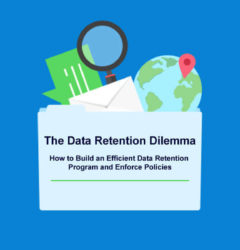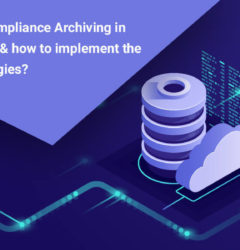
In 2021, when new-age data management to achieve better business goals is expected to peak, some companies continue to struggle with their data management and storage. Currently data privacy and safety are hot topics in the market and every individual wants his information to be thoroughly secured at all times. Irrespective of the industrial background, all companies ultimately deal with some or the other form of sensitive user data assets, which require constant protection. It’s no wonder that creating and enforcing a robust data retention policy is the need of the time.
To define data retention, it is the continued storage of an organization’s data for operational use while ensuring adherence to the compliance laws and regulations. As far as a data retention policy is concerned, then Wikipedia defines it as follows:
“A data retention policy is a recognized and proven protocol within an organization for retaining information for operational use while ensuring adherence to the laws and regulations concerning them. The objectives of a data retention policy are to keep important information for future use or reference, to organize information so it can be searched and accessed at a later date and to dispose of information that is no longer needed.”
Therefore, a company’s data retention policy is essentially a set of guidelines that describes what data will be retained, for how long, and what will happen after it is no longer needed. It also organizes documents so as to facilitate their easy search and access.
Reasons for Long-Term Data Retention
There can be several different reasons behind an organization looking to retain their data, whether it is to comply or to overcome site-wide data losses. Some of the major reasons have been explained below:
- Internal Business Processes– In most cases, the CRM application is capable of processing and managing the vast amount of data generated by business processes. But even then a robust data retention policy is explicitly needed to ensure the accessibility of the data in both the organization’s base level storage as well as the archived storage, as and when the need arises.
- Litigation– Data retention policies come in handy for organizations that are bound by legal agreements and contracts to protect their data and documents, likely to be relevant for future litigation. This retention can either be for a specified period or for the duration of the contract.
- Backup & Archiving– Through efficient data retention policies, an organization can ensure proper data backup and archiving schedules which can be helpful in the event of accidental data loss. Such policies make sure the right kind and right amount of data is retained.
- Regulatory Compliance– Finally, various government laws and industry-based standards have obligated the retaining and protection of all data, documents, and files for specific time periods.
Regulatory Compliance in Salesforce
Wikipedia defines regulatory compliance as,
“Regulatory compliance describes the goal that organizations aspire to achieve in their efforts to ensure that they are aware of and take steps to comply with relevant laws, policies, and regulations.”
In simpler terms, it is an organization’s adherence to laws, regulations, guidelines and specifications, relevant to its business processes, violations of which often results in legal punishment, including federal fines. Some prominent regulatory compliance laws and regulations include the Dodd-Frank Act, Health Insurance Portability and Accountability Act (HIPAA), Federal Information Security Management Act (FISMA), EU’s General Data Protection Regulation (GDPR) and the California Consumer Privacy Act (CCPA).
There are various key benefits when organizations comply with their industry standards:
- Upon compliance with industry standards, an organization can drastically improve the functioning of its systems and operations, thereby running more smoothly.
- Complying with regulations expands the organization’s credibility and legitimacy both inside and outside the company and builds a positive reputation among employees, customers, and the general public.
- Regulatory compliance also boosts employee productivity and creates a fair and safe workplace, which inturn leads to higher employee retention.
Also read: The Data Retention Dilemma: How to Build an Efficient Data Retention Program and Enforce Policies
Future-Proof Data Retention Strategy for Compliance
When we talk about the relation between data retention and regulatory compliance, we first need to discuss the instances when increasing demand for data privacy clashes with the demands for extended record-keeping. Two especially problematic instances have been discussed below:
- Data Retention– Oftentimes, the compliance regulations binding the company to retain data for long periods of time, make it difficult for them to comply with other data privacy regulations that impose strict limits on how businesses gather and store personally identifiable data. In other words, the new laws that demand longer data retention create some real difficulties.
- The “Right to Be Forgotten”– Even when certain data privacy laws like CAN-SPAM Act give people the ‘right to be forgotten’ (organizations must destroy all personal data about an individual upon his request), their implementation becomes difficult as it runs counter to other regulations needed for maintaining compliance. In other words, the security that comes from compliance with industry regulations can seem contrary to maintaining user privacy.
Even after the above-mentioned problems are taken into account, a robust data retention policy is extremely necessary for an organization. Innumerable organizations around the globe have a Salesforce data retention policy to comply with both their internal policies as well as the governmental or industry regulations. When stringent data retention policies are being implemented for various compliance reasons, it is also important to acknowledge the role of data backup and data archiving in the overall process.
The kind of data backed up by the policy will determine the speed with which it will recover after losing data. If too little or wrong kind of data is backed up or even when too much right data is backed up, it will create problems. Similarly with data archival, it is important to ensure that the policy properly creates a comprehensive data archive in a cheaper storage and ensures easy search and accessibility. Here we introduce two applications from our data management suite that can help Salesforce users.
First is the #1 AppExchange data archival application called DataArchiva which can not only help in retaining the data for longer time periods but also helps in reducing the storage costs and optimizing the CRM performance. DataArchiva is a flawless digital application that archives unused Salesforce data within the platform itself, at a native level in Salesforce’s big data-based storage system called Big Objects. This compliance-ready, user-friendly, and highly scalable application can also manage a large volume of data without any hassle. DataArchiva can help you save more than 85% of your data storage costs as well as secure your data while allowing your compliance team to search any data at any time. For more information, you can get in touch with us or request a demo here.
Watch how the app works.
Another application is the recently-launched DataBakup which is a robust data backup and recovery solution that is custom-designed to offer both full and incremental backup services along with a seamless restoration feature. With DataBakup, Salesforce customers can get rid of their fears associated with losing critical business data as it not only safeguards the data but also ensures its security within the cloud infrastructure. For more information about this highly scalable and cost effective solution, you can get in touch with us or request a demo here.








